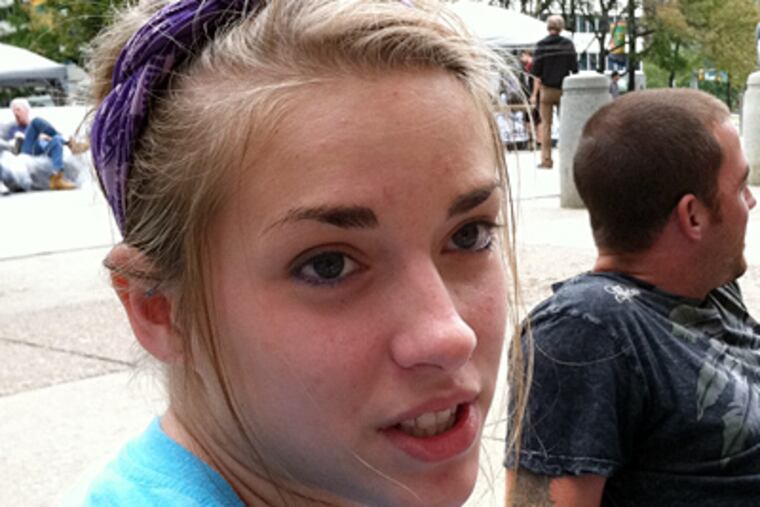Tales of hardship from Occupy Philly crowd
It's election season and the news is ripe with endorsements, posturing, debates, and sonorous analysis. But there has been little electioneering at City Hall, where Occupy Philly protesters have been camping since Oct. 6.

It's election season and the news is ripe with endorsements, posturing, debates, and sonorous analysis.
But there has been little electioneering at City Hall, where Occupy Philly protesters have been camping since Oct. 6.
"I think anybody in their right mind would not want to be president because it's too much," camper Chelsea Hines, 18, of Drexel Hill, said as she sat outside a tent this week.
Mainly, there seemed among the demonstrators a distrust with the entire political system.
"I'm not at ease with anyone in politics," Hines said, noting that every president, including Barack Obama, goes gray within two months of getting the job.
Nearly everyone interviewed had a tale of personal financial hardship, and nearly everyone expressed little conviction that any single politician could do much to fix the struggling economy, which has left 14 million Americans out of work.
Which is exactly the point made by Richard Mori, 60, of New Hampshire, in town to visit his laid-off girlfriend, Patty Reutemann, 58. They dropped off food and blankets for the protesters.
"There's no one person who can solve the issues all by themselves," Mori said, adding that libertarian presidential candidate Ron Paul "is the only person who speaks the truth."
Mori owned a bookstore, but business slowed and he closed it. Reutemann, of Ambler, lost her job as a school guidance counselor in June 2010.
Reutemann later said she was appalled to see all the young people there.
"I think they were there because they didn't have jobs," she said. What would constitute an improvement in the economy for Reutemann would be meaningful jobs for the people occupying the plaza at City Hall - enough jobs so they wouldn't have the time or desire to protest.
Her daughter, who is 27, has a job, but "my contemporaries' children are struggling. A lot of my daughter's friends were not able to keep their jobs in this recession."
Mori said he would know the economy had improved when people started buying collectible books again, but that won't happen, he said, "until people have faith and trust in the government."
Stanley Joseph, 26, an unemployed information technology professional, manned the information booth Tuesday. A graduate of Central High School and Pennsylvania State University, he's now looking for work.
Joseph backs President Obama - unenthusiastically. "Obama is our best shot right now, but I can't say I'm 100 percent happy with what he's done. He seems to be so conciliatory toward the right and to belittle us on the left."
Joseph said he would like the government to invest more in infrastructure to improve the economy.
That would happen if campaign-contribution rules changed, because "money is a corrupting influence over politics," he said. "In the long run, if politicians aren't making decisions to benefit corporations, they would be able to make more decisions to benefit the rest of us."
What Hines wants most are answers - and the confidence that one day she would be able to support a family.
Hines, the Drexel Hill camper, graduated from high school in June and now works in a pizza parlor, hoping she can get enough financial aid to attend Delaware County Community College.
She turns over half her earnings to her family - two working parents, and two brothers, 20 and 13.
The 20-year-old was laid off from a job in a lumber yard. Her father, a news junkie, earned a journalism degree in college and drives a truck. Her mother works as a school secretary, moonlighting as a hairdresser.
"It's not enough," Hines said. "It's never enough."
They lost their home to foreclosure. Now they live in a rental home down the street.
"A lady came and locked the door of our house," Hines said. "It was a very saddening experience to have a stranger tell me that I can't live in my home. I walk by it every day. There's a padlock on the door and nobody lives there.
"I don't understand why my parents, who both have jobs, can't afford to live in a rowhouse," she said.
"Something has to be wrong."